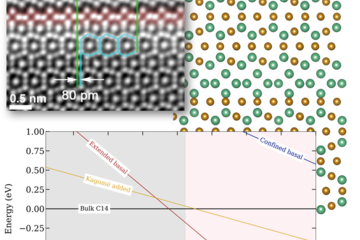All genres
1221.
Talk
Ab-initio based calculation of GaN surfaces, interfaces, and extended defects. Colloquium Paul-Drude-Institut Berlin, Berlin, Germany (2008)
1222.
Talk
Simulation of surface growth processes. 4th International Workshop on Crystal Growth Technology (IWCGT-4), Beatenberg, Switzerland (2008)
1223.
Talk
Using Density Functional Theory to Predict Material Properties of Alloy and Biological Systems. Invited talk at University of Groningen, Department of Biomedical Engineering, Groningen, The Netherlands (2008)
1224.
Talk
Optical properties of semiconductor nanostructures including strain and piezoelectric effects. PARSEM meeting and workshop, Cambridge, UK (2008)
1225.
Talk
Using DFT to Predict Mechanical Properties of MgLi Alloys. APS Meeting, New Orleans, LA, USA (2008)
1226.
Talk
Ab initio Investigations of Temperature Dependent Effects in MSM Alloys. Antragskolloquium SPP1239, Dresden, Germany (2008)
1227.
Talk
Computational alloy design by ab initio based growth simulation. 9. Kinetikseminar der DGKK, Aachen, Germany (2008)
1228.
Talk
Optimizing materials properties and epitaxial growth of semiconductor devices by ab initio based multiscale modeling. Workshop "Molecular Modelling and Simulation in Applied Materials Science", Frankfurt a. M., Germany (2008)
1229.
Talk
Using Ab Initio to Predict Engineering Parameters in bcc Magnesium-Lithium Alloys. American Physics Society March Meeting, New Orleans, LA, USA (2008)
1230.
Talk
Using DFT to Predict Mechanical Properties of MgLi Alloys. DPG Meeting, Berlin, Germany (2008)
1231.
Talk
Enhancing N solubility in diluted nitrides by surface kinetics: An ab-initio study. Spring meeting of the German Physical Society (DPG), Berlin, Germany (2008)
1232.
Talk
Charged defects in a supercell formalism: From an empirical to a fully ab-initio treatment of finite-size effects. Spring meeting of the German Physical Society (DPG), Berlin, Germany (2008)
1233.
Talk
Ab initio up to the melting point: Influence of vacancies and explicit anharmonicity. Spring meeting of the German Physical Society (DPG), Berlin, Germany (2008)
1234.
Talk
Ab initio analysis of the carbon solubility limits in various iron phases. Spring meeting of the German Physical Society (DPG), Berlin, Germany (2008)
1235.
Talk
Thermodynamics and adatom kinetics of non-polar GaN surfaces. Spring meeting of the German Physical Society (DPG), Berlin, Germany (2008)
1236.
Talk
Plane-wave implementation of the k.p-formalism including strain and piezoelectricity to study the optical properties of semiconductor nanostructures. Spring meeting of the German Physical Society (DPG), Berlin, Germany (2008)
1237.
Talk
An ab-initio study of the hydrogen-bond network in crystalline alpha-chitin. Spring meeting of the German Physical Society (DPG), Berlin, Germany (2008)
1238.
Talk
A new approach to obtain electrochemical E/pH diagrams derived from the viewpoint of semiconductor defects. Spring meeting of the German Physical Society (DPG), Berlin, Germany (2008)
1239.
Talk
An ab-initio study of the phase transitions in the interstitial Fe–C solid solutions. Spring meeting of the German Physical Society (DPG), Berlin, Germany (2008)
1240.
Talk
Phase transformations of Ni2MnGa shape memory alloy from first principles. Spring meeting of the German Physical Society (DPG), Berlin, Germany (2008)










